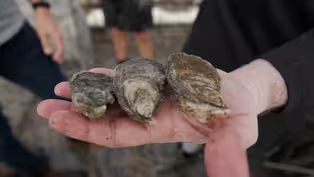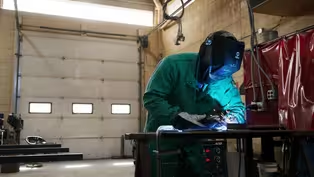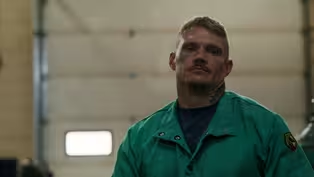
How A Dying Downtown Sparked a Small Business Revival
Clip: 3/7/2025 | 7m 43sVideo has Closed Captions
When Marion, NC's downtown was dying, leaders tried something unexpected—and it worked.
Small towns across America are watching their once thriving downtowns decay. But Marion, North Carolina found an unexpected solution. By betting on local entrepreneurs instead of big employers, they transformed vacant storefronts into thriving businesses. Now, they face a new challenge: success is driving up costs. Can they keep their small-town charm while managing big-city growth?
Problems playing video? | Closed Captioning Feedback
Problems playing video? | Closed Captioning Feedback
ncIMPACT is a local public television program presented by PBS NC

How A Dying Downtown Sparked a Small Business Revival
Clip: 3/7/2025 | 7m 43sVideo has Closed Captions
Small towns across America are watching their once thriving downtowns decay. But Marion, North Carolina found an unexpected solution. By betting on local entrepreneurs instead of big employers, they transformed vacant storefronts into thriving businesses. Now, they face a new challenge: success is driving up costs. Can they keep their small-town charm while managing big-city growth?
Problems playing video? | Closed Captioning Feedback
How to Watch ncIMPACT
ncIMPACT is available to stream on pbs.org and the free PBS App, available on iPhone, Apple TV, Android TV, Android smartphones, Amazon Fire TV, Amazon Fire Tablet, Roku, Samsung Smart TV, and Vizio.
Providing Support for PBS.org
Learn Moreabout PBS online sponsorship- Decaying main streets are plaguing small-town America.
Vacant storefronts, an exodus of young people, and crumbling infrastructure paint a pretty bleak picture.
However, in some rural towns, Main Street isn't just surviving, it's booming, but as these towns come alive, prices go up, and some locals are having a hard time affording to live in their hometowns.
So, what's the recipe for breathing life back into main streets, and how do towns ensure that their growth doesn't push out the very families who have called it home for generations?
I'm David Hurst.
This is "ncIMPACT."
[poised music] Like many small towns, the 2008 recession hit Marion, North Carolina hard, but the truth is the decline started long before that.
First came shopping malls in the 1950s, drawing people away from downtown, then big box stores arrived, offering prices that small businesses couldn't match.
By the time 2008 hit, many downtowns were already struggling to survive.
- Downtown was pretty void.
I mean, you know, a lot of the owners of the buildings downtown, if they could just find a tenant, you know, they were happy.
- [David] Downtown vacancy rates in Marion climbed to 25%, and like many small towns, they faced a critical question: how do you bring life back to a dying downtown?
A lot of times, that means betting the farm on landing a big employer, like a factory or a corporate headquarters, even a distribution center, but that strategy doesn't always work for rural communities.
- The old adage of "if you build it, they will come" is nonsense.
That does not happen, particularly if you're just not prepared.
- [David] So, in 2016, Marion launched the Growing Entrepreneurs Marion program, or GEM.
The program connects aspiring business owners with training, mentorship, and potential funding sources.
For qualifying businesses, the program includes rent and utility assistance for their first six months of operation.
- We've had, I think, 160 or so graduates in the first seven, eight years of the GEM program, representing 80 existing or new or prospective businesses, and investment, private investment of over $5 million.
The vast majority of that, 2/3 of that, has been in downtown Marion, which was our hope and dream, but it's come to fruition.
- So, this section right here is kind of our olive oils and our infused balsamics.
It's kind of the bread and butter of the business.
- [David] One of the graduates is Doug Watson.
He grew up in Marion, but like many of his generation, left for a job out of town.
- Well, I left the corporate world, so I kinda just walked, left that world altogether.
I came back to Marion and really didn't know what I was gonna do in my next chapter, and just decided, "You know what?
Let's become an entrepreneur."
- Doug started small at just 600 square feet, but today, his business, Flavors on Main, occupies 10 times that space in the heart of downtown.
And growing up, did you ever envision that you would own a business like this in the heart of downtown?
- Never.
Never entered the equation for me, but now it's like, I love it.
Absolutely love it and I feel like we make an impact for the town, you know?
We're trying to be that anchor store that hopefully helps other businesses, and you know, we support other businesses, we work closely with other businesses, and you know, we try to work together to make everybody successful.
- [David] Today, available downtown space is hard to find, a dramatic shift from those vacant streets a decade ago.
To see this transformation firsthand, my colleague, Anita Brown-Graham, took a walk through downtown Marion with Mayor Steve Little and town manager, Bob Boyette.
- This store here is occupied by a GEM graduate, and a previous person had been a GEM graduate and she relocated to another town, and when it became available, he moved right in.
- [David] But success has brought unexpected challenges.
Think about this.
For every 100 new North Carolinians, 95 of them are moving from other states like New York or California.
But it's not just people moving to North Carolina.
It's also their wealth.
North Carolina now ranks six nationally as a destination for millennials making over $100,000 annually, so as more people move in, the demand for housing grows, but their buying power also drives up prices.
- Growth happens and property values do go up.
We just try to help keep it within a balance as best we can.
- [David] And city leaders noticed two trends.
There was a desire for more residents to move downtown and there were property owners that had vacant second or third floors in their building, so they launched a program that helps property owners convert vacant upper floors into affordable apartments.
But this sounds like a lot of change for a small town.
I know every time I go back to my hometown after being away, I'm struck by how much can change in just a year or two.
It's a feeling I'm sure many of us know well, and it's one that residents of Marion are also experiencing.
- I mean, if you go back and look at where Marion was 5 to 10 years ago and where it is today, people come into town that haven't been here in years and they're amazed.
- But watching my own hometown transform over the years has always made me wonder, how do you move forward without losing what makes a place special?
For Marion, the answer wasn't to freeze time.
It was to find creative ways to keep their history alive while welcoming the new.
Since the 1970s, the federal government has incentivized historic building revival through tax credits.
North Carolina enhanced its own program in 1998, leading the nation in historic rehab projects.
In Marion, they help business owners update their storefronts while keeping their historic charm.
We're sitting here in your office.
It's the old train depot.
- Yes.
- What role does historic preservation play in downtown redevelopment?
- Part of the Main Street focus is historic preservation, and so downtown Marion is listed on the, is a historic district, so part of the facade grant program is helping to preserve those buildings and protect those buildings, and so being in a historic building myself, that gives us just a particular way to say, this is, you can restore a building or rehab a building for use.
We just kinda be here to guide those people to make sure that they save those buildings that are so much a part of our history and our heritage.
- [David] Well, one of the best examples of historic preservation may be the Miller Business Complex.
This former factory now houses modern businesses while maintaining its historic character.
Daniel Rodriguez Jr. owns Burrito Bros, a restaurant that operates out of the Miller Business Complex.
It's a full circle moment for Rodriguez, who used to work at the factory.
- So, coming back to it was just kinda, it was a weird feeling.
In a way, I liked it because it was a whole new circumstance.
You know, I was working for myself in this location and it was just awesome knowing that I used to haul trash through here when I used to work here to, you know, being the owner of a restaurant that's here, so that's a cool feeling.
- [David] Today, Marion's downtown tells a different story than it did a decade ago.
- You can walk downtown on the sidewalk in the evenings any night of the week, and you'll see stores open, restaurants, other businesses that are open, people visiting, talking, eating, having a beverage on the sidewalk, and it's just invigorating.
- [David] But as towns like Marion grow more attractive, they face new challenges like rising housing costs and the need to balance progress with preservation.
For "ncIMPACT," I'm David Hurst.
North Carolina is Betting Big on the Oyster
Video has Closed Captions
Clip: 3/7/2025 | 6m 32s | North Carolina's oyster industry is booming again, but can farmers avoid the mistakes of the past? (6m 32s)
Preview | Economic Development
Video has Closed Captions
Preview: 3/7/2025 | 20s | As some cities boom in a growing state, small towns craft homegrown solutions for their future. (20s)
This Community College is Betting Big on Adult Learners
Video has Closed Captions
Clip: 3/7/2025 | 6m 49s | An innovative program at Wilkes Community College is helping adult learners complete their degrees. (6m 49s)
Providing Support for PBS.org
Learn Moreabout PBS online sponsorship
- News and Public Affairs

Top journalists deliver compelling original analysis of the hour's headlines.

- News and Public Affairs

FRONTLINE is investigative journalism that questions, explains and changes our world.












Support for PBS provided by:
ncIMPACT is a local public television program presented by PBS NC


